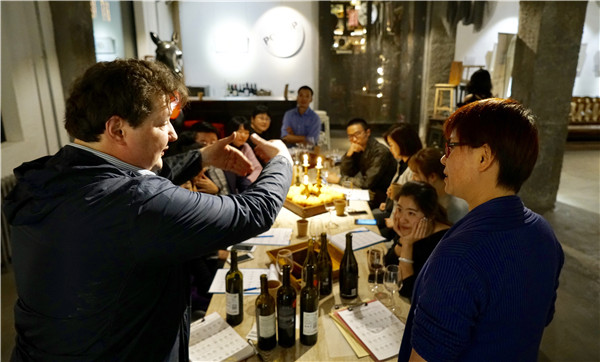Casual drinkers cheer development of local wines
 |
|
Jim Boyce (left) and Ma Huiqin (right) with a group of judges at the recent wine-tasting event in Beijing. [Photo by Zhang Zefeng/China Daily] |
Four clusters of wines sit on a long vintage metal table in a spacious Beijing art gallery, where a mix of Chinese and Western antiques are displayed. Accompanied by popular music from the 1950s, a group of judges take turns sampling the bottles. They pour some of each wine into a glass, take a sip, taste and swirl, spit it out, then write down their impressions.
But this isn't a scene from a professional wine competition. It's the Grape Wall Challenge, one of the few Chinese wine-tasting events that puts the spotlight on Chinese wine consumers instead of oenological experts. This year, the eighth annual event took place at Pop-Up Beijing around the Chinese New Year.
First held in 2009, the event traditionally focuses on popular wines from around the world priced at less than 100 yuan ($15) that are usually neglected by experts and the media. But this year, event founder Jim Boyce from Canada decided to introduce 16 small-scale, high-quality Chinese wines.
"When I started doing this tasting contest years ago, I couldn't find 16 Chinese wines like this," says the Beijing-based wine blogger. "Today, I have about 50 choices to get down to 16, so we can see the quality going up very fast."
This year's selections are available nationally, and had won prizes or got good reviews overseas. They largely came from small to medium-scale wineries including Shandong's Chateau Nine Peaks, Shanxi's Grace Vineyard, Xinjiang's Tiansai and Ningixa's Hansen, Kanaan, Legacy Peak and Silver Heights.
The price of the white and red wines range from around 150 yuan to 330 yuan. In the course of four flights, the judges-most of them casual wine drinkers-are asked to score each wine as "love it", "like it", "dislike it" or "hate it".
According to the International Wine and Spirits Research, China has emerged as the fifth largest consumer market and No 10 wine producer globally. However, the general consumers' knowledge of wine remains weak.
"There is a huge gap between experts and consumers in terms of wine knowledge," says professor Ma Huiqin of China Agricultural University who has been in the wine industry for more than 20 years.
















